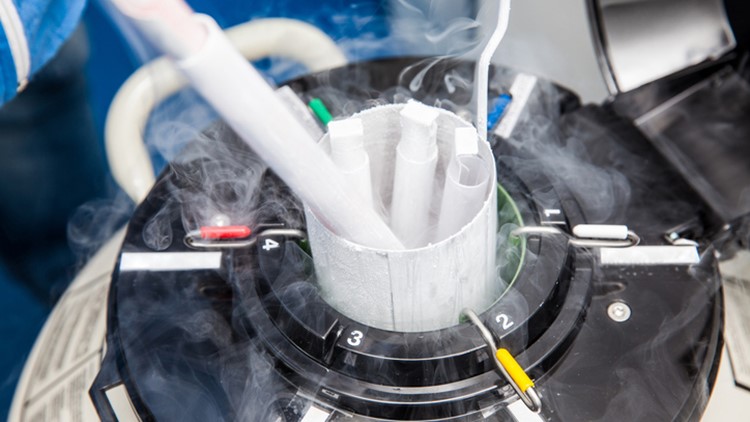MISSOURI, USA — When Jalesia Kuenzel’s twin sons turned 16 last year, she was also thinking of the children that could have been.
Four embryos were created when she and her ex-husband were going through in vitro fertilization. Two became her sons. The other two remain frozen in a storage facility in Pennsylvania.
It’s been nearly a decade since Kuenzel’s divorce led to a legal fight that garnered national attention as she fought for custody of the embryos. She’s now 52, remarried and living in De Soto.
“These are wanted embryos,” Kuenzel said. “These are embryos that have been deliberately created by the parents because they chose to be parents. It’s not something you do by accident.”
A Missouri court ultimately ruled the embryos were property that couldn’t be used without the consent of both Kuenzel and her ex-husband.
As a result, Kuenzel took to activism. She wants to change Missouri law, and sees the new political landscape, which includes a near total ban on abortion, as an opportunity to jumpstart the conversation.
Kuenzel opposes abortion, and she appreciates the support she’s received over the years from anti-abortion organizations.
But she doesn’t want her fight to get wrapped up in the issue.
“It’s really about trying to protect these women and some men,” she said, “who wanted their children, their embryos, and still do.”
Last year, Kuenzel reached out to state Rep. Adam Schwadron, a Republican from St. Charles who she met two decades ago at the Creve Coeur Township Republican Organization meetings.
Schwadron agreed to file a bill that would require embryo custody disputes to be decided by a court in favor of the person most likely to create a child from the embryos. Similar legislation has also been filed by state Sen. Karla Eslinger, a Republican from Wasola.
Both bills would mandate courts to presume the “best interests of the embryo” are to grant custody to the person who “intends to develop the embryo to birth.”
The legislation was first introduced in 2017, when it was passed by a House committee near the end of the legislative session. Its progress stalled after that, and it hasn’t regained momentum in subsequent years.
“I am pro-life and I see a frozen embryo can still become a life,” Schwadron, who is running for Missouri secretary of state, told The Independent. “ … If that life is wanted, it will be loved and it will be nurtured.”
Critics, however, say the idea raises serious concerns over consent and personhood.
The latter remains central to some anti-abortion movement efforts after the constitutional right to abortion was overturned by the U.S. Supreme Court in June 2022. Personhood was written into Georgia’s abortion ban, where women can now claim a tax exemption on fetuses with a detectable heartbeat. Organizations like the American Society for Reproductive Medicine have warned that personhood laws could criminalize some contraceptives and restrict infertility treatments.
“I see children coming into being without being wanted by one of their genetic forebearers,” Mary Beck, a law professor at the University of Missouri, said of the Missouri legislation. “Surely no one thinks that’s a good thing.”
A legal battle over embryos
In vitro fertilization was both lengthy and emotionally and financially draining for Kuenzel.
In the U.S., an estimated one in five women of child-bearing years who’ve never birthed experience infertility, according to the Centers for Disease Control and Prevention. In vitro fertilization can often be a solution, and it’s estimated there are at least one million embryos sitting frozen across the country — and the number is growing.
Embryos are created when two individuals undergo IVF, or the process of fertilizing an egg with sperm outside of the womb. An embryo is created, and typically frozen until the couple wants to implant the embryo in a womb.
Before they began the process at the fertility clinic, both Kuenzel, whose last name at the time was McQueen, and her then-husband signed paperwork agreeing that in the case of divorce, she would get any remaining embryos, Kuenzel said.
A court would later decide the contract was invalid.
Through IVF, they successfully created four embryos. Two became their twin boys.
When their marriage fell apart, Kuenzel wanted the embryos because she wanted more children. Her ex-husband did not want another child.
The case went to court where Kuenzel won support from anti-abortion groups like the Thomas More Society and Missouri Right to Life.
A representative of the Thomas More Society at the time argued that embryos were “living beings” rather than property, and as such, legal standards had to be in the embryos’ best interest.
The courts ultimately decided in 2015 that under Missouri law, the embryos were marital property rather than children. Custody of the embryos was awarded jointly to Kuenzel and her ex-husband, meaning they could only be used if both agreed.
‘Force people to procreate’
Beck, the University of Missouri law professor who has written on the topic of embryo custody, recently assigned her students to read Schwadron and Eslinger’s bills for a class on sex reproduction and the law.
“If cryopreserved, pre-implantation embryos are marital property, then I don’t know how these bills can classify these embryos as having a ‘best interest,’” Beck said.
The only state to enact such a law is Arizona, which did so in 2017.
Beck said the Arizona law is unconstitutional.
“If you force people to procreate, then you force someone to pay child support,” Beck said. “You essentially give them care and custody of a child that they don’t want to come into existence, so I find it a very troublesome existence.”
She noted Missouri’s legislation would allow for parental rights to be terminated, which would exclude the unwilling participant from paying child support.
Beck fears despite this, such legislation would create a chilling effect, leaving some people second-guessing whether to create embryos in the first place.
She also sees the legislation as “attempting a backdoor approach to giving personhood to embryos.”
The fight to grant fetal personhood, which would grant legal rights at the point of conception, has picked up steam as the next frontier for the anti-abortion movement.
Rita Gitchell, an attorney who represented the American Association of Pro-Life Obstetricians and Gynecologists, argued in the friend-of-the-court brief filed in Kuenzel’s lawsuit that life begins at conception and embryos are human beings.
Now she’s arguing the Missouri bills are personhood bills for the same reason. Gitchell told The Independent, “because human beings should have more protected rights than property rights. We’re not fighting over property, we’re fighting over human beings.”
Schwadron said any claim that his bill is an attempt to establish fetal personhood is false because Missouri statute already says life begins at conception.
But others aren’t so sure.
“What we’re seeing is anti-choice legislators who have run out of things to do,” said Sean Tipton, chief advocacy and policy officer for American Society for Reproductive Medicine.
Tipton said it’s worth noting that the latest re-filing of the bill in Missouri came shortly after the U.S. Supreme Court’s Dobbs decision.
“There are people who have a political interest in equating a fertilized egg in a laboratory with an existing child,” he said. “We think that comparison is invalid scientifically, constitutionally and legally.”
Ultimately, he said, the decision should be left to the people involved in creating the embryo and no one else.
“It shouldn’t be a judge. It shouldn’t be a politician,” Tipton said. “Those people shouldn’t decide what’s going to happen to the reproductive tissues of the citizens of Missouri.”
To his knowledge, Arizona’s embryo custody law has not yet been challenged in court.
Chani Levertov, the founder of Fruitful, an organization based in Arizona that supports those struggling with infertility, said the new law has not affected the work her organization does.
“We offer support to those navigating infertility and it has never come up,” she said in an email.
‘Give them a chance to be born’
While her case was playing out in court, Kuenzel created an organization called Embryo Defense. She said she still gets messages from people – mostly women, and mostly older – who ask if they’re crazy for wanting to keep their embryos. Kuenzel tells them they’re not.
Kuenzel brushed aside arguments that the legislation she’s pushing would force some people to become parents.
“That’s the whole reason for doing IVF is to be a parent,” she said. “ … It’s not something you do by accident.”
In 2016, Kuenzel made frequent appearances in newspapers and on TV stations as she pleaded her case to national audiences. At one point, she said, one of her sons looked at her and said he was glad he was one of the embryos to “get out.”
That off-hand comment comes to mind when she thinks about the embryos sitting in the cryobank in Pennsylvania, she said, which she named Noah and Genesis.
If custody were granted to her tomorrow, Kuenzel said she’d implant the embryos. If she were able to obtain custody after menopause, she said she would donate them to someone trying to grow their family.
“Give them a chance to be born,” Kuenzel said. “That’s my job as a mother. They’re very well wanted and loved by me.”
This story from the Missouri Independent is published on KSDK.com under the Creative Commons license. The Missouri Independent is a nonpartisan, nonprofit news organization covering state government, politics and policy.



